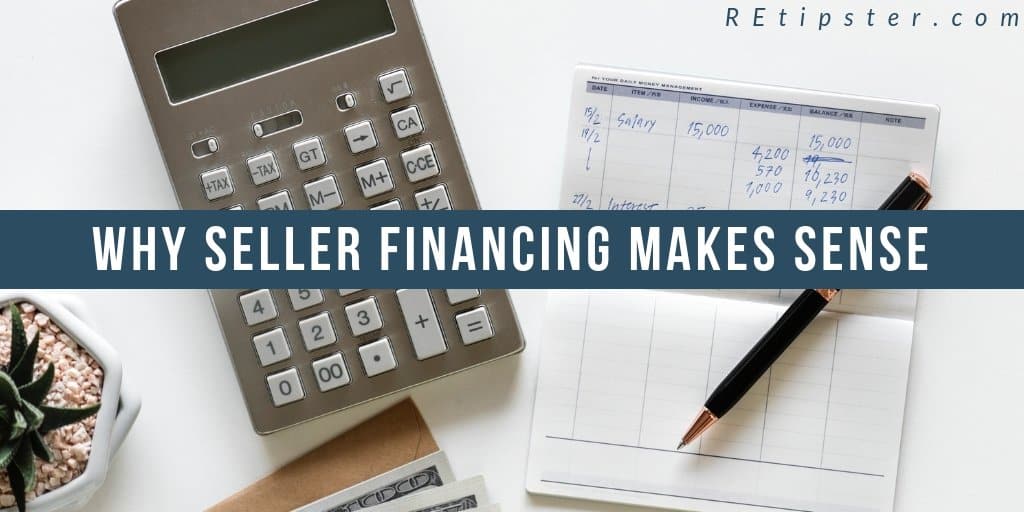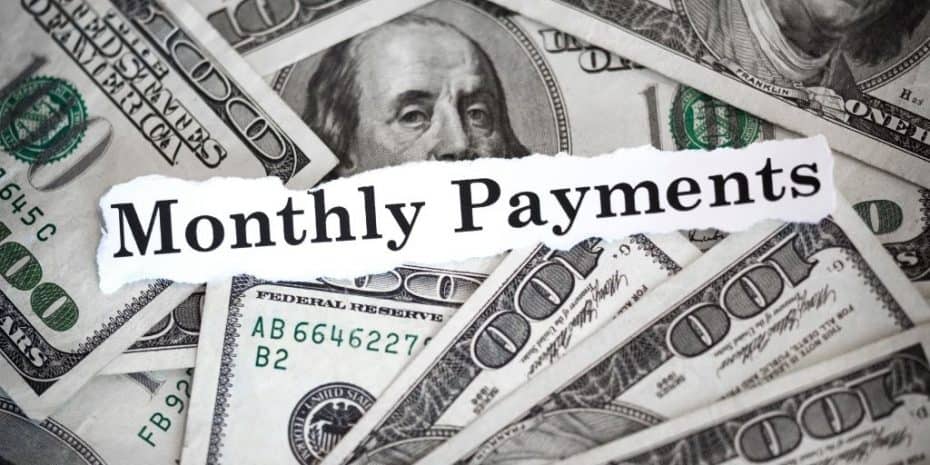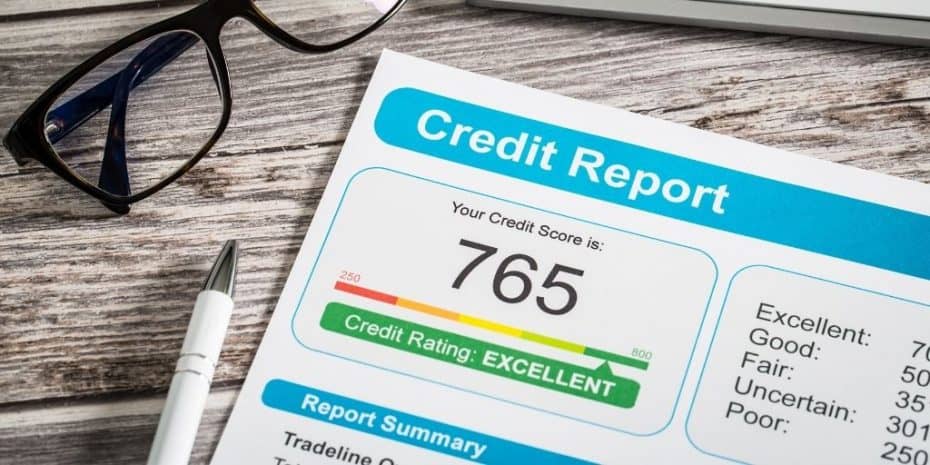
REtipster does not provide tax, investment, or financial advice. Always seek the help of a licensed financial professional before taking action.
When I first learned about seller financing, the idea of “becoming the bank” didn't sound appealing to me AT ALL.
When I sold my properties, I just wanted to be cashed out as soon as possible so I could take my cash and move on with my life.
But I decided to try my hand at it once I realized the truckload of extra money I could make from financing my properties.
After selling one property with owner financing and then another, I realized how nice it was to have money deposited in my bank account every month, like clockwork, whether or not I continued to sell any more properties. Eventually, I found that it added a lot of stability and predictability to my revenue, and I loved it for that reason alone.
Before long, I started utilizing owner financing whenever possible, and it quickly became my preferred way to sell real estate. Why? Because whenever I offered this kind of financing to my buyers, I created a money machine that would continue to pay me years into the future.
Benefit #1: Sell Properties Faster
Seller financing opened the doors of opportunity for many of my buyers, allowing me to work with people who otherwise never would've had the cash to buy the properties I was selling.
Many would-be buyers won’t even consider buying real estate because they don’t have enough cash to purchase it. When I started offering seller financing, I was solving a massive problem for these people because I gave them the financial leverage they needed to do business.
The more flexible I was with when and how I received payment for my properties, the faster I could get my properties sold, plain and simple.
Before offering seller financing (when I was only willing to get cashed out in one lump sum), I sat with unsold inventory longer than needed.
Benefit #2: Sell at a Higher Price
One of the huge advantages of financing my properties was that I could almost always ask for a significantly higher price for each property, and people were happy to pay it. In most cases, I could even charge a higher-than-market interest rate, and most buyers didn’t care!
I could do this because, in my buyer’s mind, their primary concern wasn't the property's total price or interest rate but whether or not they could afford the monthly payment.
In most cases, when I advertise my properties with seller financing, I don’t even talk about the specific terms of the loan (interest rate, payment period, etc.). Of course, this information has to be included in my closing documents (I’m not hiding this from anybody). Still, when it comes to marketing a property, most people will only get confused by the intricate details of the transaction (and a confused mind says “No”).
In the end, they ultimately want to know one thing,
“What it’s going to cost me?”
With this in mind, I only advertise two things:
- The total purchase price.
- The monthly payment.
That’s all.
When people see a monthly payment, they have a pretty good idea of whether it will fit into their budget – and at the end of the day, this is all that matters to most people.
The nice thing is, if my goal is to make the monthly payment affordable, there is almost always a way to make the payments work within a person’s budget.
Remember, with seller financing, I am the bank. If I'm willing to allow it, I can stretch out the amortization term (i.e., the months it will take them to pay me back).
I can also adjust the numbers by giving them a lower interest rate. If someone's biggest concern is getting a lower interest rate, I could charge them 0% interest if I wanted to and make up the difference by increasing the sale price… which would effectively keep their monthly payment the same!
Likewise, I can require a larger down payment upfront (which will lower the loan amount and reduce the monthly payment), or I can lower the price altogether.
Ultimately, whatever it takes for me to sell a property and make money (creating a win-win for both parties involved), I can do it! One of my goals with this strategy is to build up SEVERAL streams of income, and this only happens by selling SEVERAL properties with seller financing in a way that will earn me a profit.
When acting as the lender, I can generally do whatever I want (within the confines of the law) to maximize my income over the long term.
Note: Most states have specific rules regarding the maximum interest rate you can charge your borrowers and the number of seller-financed deals you can maintain at one time – so be sure to check with a local attorney before proceeding.
Benefit #3: Interest Income
In addition to getting a higher price on a property, seller financing allows me to pick up some extra income by charging interest, servicing, and closing fees.
When I sell properties with owner financing, the standard interest rate I charge is 9.99% interest, and people are happy to pay it!
Why? Because if I don’t finance the property for them, they can't buy it, period.
Remember, the interest rate is irrelevant for many buyers as long as they can afford the monthly payments. It’s about making the property affordable for the borrower with a down payment and monthly payment they can live with.
With all the prospective buyers I’ve talked to over the years, I’ve found that different things matter to different people.
- Some buyers want a lower price.
- Some buyers prefer a lower payment.
- Some buyers are attracted to the idea of paying 0% interest.
Whatever my buyer happens to care about the most (whatever the sticking point is), I can usually give them what they want.
The ultimate goal is to make a monthly profit on each sale, so if I can meet their needs AND accomplish my objective, I'm happy to do it! Generally speaking, as long as my buyer gets great value for their money, they’re happy to work with me.
Many buyers are huge fans of seller financing, so don’t underestimate the power of simply offering this as an option in your property listings.
The funny thing is that whenever I offer seller financing in my property listings, almost everybody chooses to take the financing option and NOT pay all cash (even when there is a financial incentive).
This means you can play with your pricing a bit when offering seller financing. If you want your buyers to pay cash, you can price the cash asking price to look like a no-brainer compared to the seller financing asking price. Or, if you want your buyer to buy with seller financing, you can price the cash asking price so that it looks worse compared to the seller financing option.
You can do these things if you're willing to offer seller financing, but if you're only willing to list it at one price for cash, you can't.
That's right! Even when people have the cash available, many will make long-term monthly payments instead of losing all their cash by paying the full purchase price upfront, simply because it's a better use of their money when the price is right.
It may sound weird if you're someone (like me) who doesn't like debt, but you might be surprised at how common this is.
Benefit #4: Servicing Fees
Monthly servicing fees are another way to tack on extra monthly income from seller-financed properties. I always charge a monthly servicing fee of $15 – $25 (on top of the borrower’s monthly principal & interest payments to me).
Why? Because with every existing loan – someone has to be in charge of the following:
- Collecting the monthly payment
- Updating the loan balance
- Sending a statement back to the borrower
- Dealing with delinquent accounts (if and when they come up)
On my first few seller-financed deals, I tried to get my feet wet by servicing my loans in-house.
I had a banking background, and I understood how to do it, so the job was doable, but even so, I learned that I just didn’t enjoy spending my time doing this kind of busy work.
Servicing a loan isn’t difficult, but it does need to be done right, and it takes a lot of left-brain thinking to do the job well and track the details. As a result, I eventually decided to outsource my entire loan portfolio to a loan servicing company, saving me time and mental energy. If I could do it all over again, I probably would have started sending this work to them from day one.
Coincidentally, my loan servicing company charges a monthly fee of $15 – $25 for this service, so rather than me taking the hit for this cost myself, I just pass it along to the borrower and make them pay for it.
Remember, if it works within their budget (if their monthly payment is still affordable), why wouldn’t I let them pay for it? As long as I disclose this information in the closing documents, I can’t think of a compelling reason not to handle it this way.
Even if I did decide to service these loans myself, I would still be charging some kind of servicing fee to pay myself for the time and trouble. As long as payments come in each month, the job will always be there, so it only makes sense to compensate me (or the loan servicer) for doing this extra work.
Benefit #5: Closing Fees
When I close a loan, I must use the right documentation.
Whether I’m closing a deal in-house (preparing all the documents myself) or using a title company/real estate attorney, somebody has to put the paperwork together. Regardless of who handles this job, I always charge a minimum of $199 as a closing fee (and sometimes more if the deal is large enough), and guess what… the buyer pays for it. Even if I’m working on a cash sale (no seller financing involved), I still charge this fee because the work is always required to get the deal done.
Similar to the issue of loan servicing, the paperwork isn’t going to take care of itself, so it’s important to account for this cost and pay the appropriate person for doing this extra work (even if it means paying myself).
All of these costs are very typical in any loan arrangement. I guarantee you a bank will charge these kinds of additional fees all day long for a conventional loan, so I always take advantage of my ability to charge fees upfront, charge servicing fees each month, and charge the highest interest rate I can get away with (and I don’t feel bad about it). If people don’t want to do business under my terms, they’re welcome to look elsewhere!
When acting as the lender, I can be as flexible (or inflexible) as I want because I am the bank and can clearly define the terms under which I’m willing to do business. One of my biggest advantages is my ability to play the game on my terms.
Benefit #6: Put the Problems in the Borrower’s Lap
Of all the things I love about seller financing, this might be my favorite.
When I finance the sale of a property, it becomes similar to a rental property in that it produces a steady income stream but without all the problems and headaches that come with owning a rental property.
Once the deal is closed, my borrower essentially owns the property. Sure, I may still hold the deed (when I’m using a land contract), but as long as they keep making payments to me, the property legally belongs to them.
In most standard loan documents, the loan agreements are written so that if anything breaks, needs to be fixed, or goes wrong with the property itself, it’s the borrower’s problem.
In the same way, I wouldn’t expect my banker to come and fix my toilet after I buy a house – the borrower shouldn’t expect me to come and take care of their property, either. It’s their property, and the problems are theirs to deal with.
Of course, a seller-financed property is a stream of income that won’t last forever (because the borrower will eventually pay off the loan), but believe me – it’s great while it lasts (and it usually lasts for a long time). When I finance the sale of my properties, I don’t lose a wink of sleep at night because once the deal is done, all the maintenance and upkeep issues are in the borrower’s lap, not mine.
Benefit #7: Stability and Peace of Mind
As soon as I had built enough cash reserves to run my business efficiently, I started financing my properties as soon as possible.
Why? Because I desperately wanted more stability and peace of mind in my business, and the regular cash flow from my seller-financed deals played a big role in making this possible.
I know some real estate investors who make over six figures per month from the ongoing payments from their seller-financed properties!
The beautiful thing about the properties I finance is that, in most cases, I only paid a fraction property’s market value when I bought it.
Think about it: if you buy a property for $10,000 and sell it with seller financing for $20,000 or $30,000 – you can make your entire initial investment back with just the down payment! Once the loan is in place, every monthly payment for the remainder of the loan term is pure profit. How’s THAT for a return on investment??
Charging Prepayment Penalties
When a borrower wants to pay off their loan early – some lenders will require that the borrower pays a prepayment penalty in the process.
Why? Because the borrower is killing off a stream of income (with interest) that the lender was counting on.
A lender can't disallow this from happening, but one way to discourage these early payoffs is to charge a prepayment penalty if the borrower decides to do this. It will also compensate the lender for the unexpected loss of income.
Personally, I've never bothered with charging prepayment penalties like this (because I'm already making a huge profit on the regular sale price of the property), but I understand why some lenders do it.
If I wanted to add this extra security to my seller-financed deals, I could have it written into the language of my loan agreement. There are many different ways of calculating precisely what this penalty could be, but one way is to charge an extra:
- 5% of the original balance if they pay off in the first year,
- 4% of the original balance in the second year,
- 3% of the original balance in the third year,
- 2% of the original balance in the fourth year,
- etc…
If you’re working with an attorney to prepare your loan documents (which you should probably do, especially if you’re adding this extra feature to your loan documents), ask their opinion on this. They may have some good ideas for you as well.
On the other hand, if you're working with a higher-risk borrower (and many seller-financed deals are), getting an early payoff is not a bad thing, and as such, you probably don't want to penalize your borrower for giving you your money. This is a much better outcome than having the borrower default on their payments altogether.
I don't charge prepayment penalties because I don't want to make it harder for my borrower to give me money. Not to mention, I'm already making a killing on the deal, whether they prepay or not.
Repossessing and Reselling the Property
Nobody wants to deal with a deadbeat borrower who defaults on their loan. I’ll be the first to tell you—it’s annoying. And depending on what shape they leave the property in, it could be costly.
That said, there are also a few reasons this risk is still worth taking, even considering the worst-case scenario.
Reason 1: Consider the Down Payment
Given how little I typically pay for the properties I purchase, it's not hard to recoup 100% of my initial investment by collecting a sufficient down payment. Even if I only collect a 5% down payment (which would be generous of me), I can usually recoup the remainder of my initial investment in the first few months. The risk in this area is relatively low.
If I've done my groundwork right when I purchased the property (i.e., buying for the right price), I will not end up in the hole, not by a long shot.
On the other hand, if I borrow $100,000 to buy a property worth only $125,000, this would be a different story. But as I indicated earlier, the ideal time to use seller financing is when I own a property free and clear. When I’ve paid a very low price to acquire a property in the first place, losing money is not something I have to be overly concerned with.
Reason 2: Consider the Collateral
Think about it this way: I own a long-term, tangible asset. I own it without any debt or monthly payments whatsoever. If my borrower decides to quit making payments tomorrow, this could be a blessing in disguise. It means I can repossess the property (which is probably the only real “hassle” of the process), re-list it, and resell it! I get to keep all the payments from this delinquent borrower and then start the process again. Some of the most profitable deals are the ones I get to repossess and resell.
If my property is a residential or commercial building, there could be some damage to clean up before I can re-list it for sale (this should always be expected in a foreclosure situation). Even so, repossession costs are almost always worth the extra time and effort because I stand to make even more money when I resell the property. This isn’t always the case, but most of the time, it is.
Reason 3: Consider the Likelihood of Default
When I started selling properties with owner financing, I didn’t do any credit checks on my borrowers because if they ever defaulted, I could make even more money in the long run after getting the property back and re-selling it.
While this approach ultimately hurt me, I decided to change this practice after dealing with a few borrowers who defaulted on their loan payments to me, and I realized how annoying it was (if you do enough seller-financed deals, it will happen eventually, and you'll see what I mean).
Even though I’ve always been pretty well-protected with the value of my collateral, it’s still annoying to deal with a deadbeat borrower. It takes time and money, and it's generally a headache. Even though I stood to make even more money from a repossessed property, I was more comfortable just knowing what my future would look like rather than dealing with an unexpected change of plans.
Using a Credit Report for Seller Financing
With this in mind, I eventually decided to start pulling credit reports. The borrower can pay for it, and the information gives me an idea of what kind of person I’m dealing with.
Does this person have any other delinquencies in their life right now? If so, what are they and why? Why should I feel comfortable being their lender? Why should I stick my neck out for them if they can’t give me a compelling story or excuse for missing other payments?
RELATED: How to Read a Credit Report
I typically don’t disqualify people immediately for having a bad credit score. Still, I expect a reasonable explanation as to why I should trust that they’ll be faithful in making their payments to me. If I go into this kind of relationship blind, I leave the door open for trouble—plain and simple. While this doesn’t necessarily spell “disaster” in every situation, it can cause a lot of unexpected (and unwanted) surprises.
Again, if I bought my property at the right price, to begin with, it’s hard to lose. Even so, I’m the type who likes to be fully informed on any business relationship I’m getting into. As such, I like to inquire about this basic information.
Seller Financing Makes a Lot of Sense!
As you can see, there are many reasons why seller financing makes sense. Anything that allows me to extract much more profit AND passive income from a property is worth a close look. While it does involve some extra steps, I’ve found that, in many cases, it’s worth the trouble.
If you haven’t considered this approach before, it might be time to consider it seriously.






















